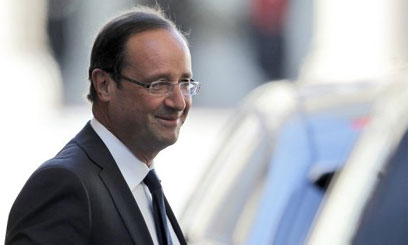 PARIS, June 10 – France was voting on Sunday in round one of a parliamentary election tipped to give Socialist President Francois Hollande the majority needed to implement his tax-and-spend programme.
PARIS, June 10 – France was voting on Sunday in round one of a parliamentary election tipped to give Socialist President Francois Hollande the majority needed to implement his tax-and-spend programme.
Hollande defeated right-winger Nicolas Sarkozy in last month’s presidential election and has called for voters to turn out en masse to give him the mandate to enact reforms as the country struggles through a financial crisis, rising joblessness and a stagnant economy.
Final opinion polls before Sunday’s vote predicted the Socialists would not see a landslide victory but would, with their Green and hard-left allies, emerge with a narrow but workable majority.
The vote will also be a litmus test for Marine Le Pen’s anti-immigrant National Front, after she won 18 percent of votes in the first round of the May presidential election.
As polls predicted that 40 percent of election-weary voters might not bother to cast their ballot, the president appealed to electors to exercise their democratic right.
“I will only be able to bring about change, the change that the French have asked me to bring about, if I have a majority in the National Assembly,” he said Thursday during a visit to the northern town of Dieudonne.
After taking 51.6 percent of the vote in the May 6 presidential run-off, Hollande moved quickly to give the Socialists an edge in the parliamentary elections, which include a second round vote on June 17.
Prime Minister Jean-Marc Ayrault’s interim government has taken a series of popular steps, including cutting ministers’ salaries by 30 percent, vowing to reduce executive pay at state-owned firms and lowering the retirement age from 62 to 60 for some workers.
But Sarkozy’s UMP party has hit back with warnings that the Socialists are preparing huge tax hikes to pay for what the right says is a fiscally irresponsible spending programme.
UMP leader Jean-Francois Cope said the Socialists are preparing “the biggest-ever tightening of the screws on the middle class” while ex-premier Francois Fillon said the party will “massively boost taxes” if given a majority.
The economic backdrop is bleak for whoever wins the parliamentary vote, with unemployment at 10 percent, stalled growth, and a resurgent eurozone crisis.
But analysts say it is unlikely Hollande will be forced into what the French call “cohabitation” by a right-wing win in the parliamentary vote.
A BVA poll on Friday gave core left-wing parties 32.5 percent, 36.5 percent if they ally with the Greens, rising to 44.5 percent if the hard left Left Front gets on board, with the mainstream right getting 33.5 percent.
An Ipsos poll for the Le Monde newspaper gave the left 31.5 percent, or 44.5 percent if they ally with the Greens and the hard left, against 34.5 percent for the right-wing bloc.
More than 6,500 candidates will be competing to fill the seats in the Assembly, which sits in a classical column-fronted building facing the River Seine in central Paris.
The left already holds a majority in the upper house Senate, which is indirectly elected.
Voting takes place under a constituency-based simple majority system, but in two rounds.
If no candidate wins more than 50 percent in the first round, any contender with more than 12.5 percent of the vote is allowed to stay in the race for the second round.
Observers will also be keeping an eye on the result for the National Front, as Le Pen looks to cement her party’s place in national politics after her strong showing in the presidential vote.
She is also facing a personal challenge from the Left Front’s Jean-Luc Melenchon, who won 11 percent in the presidential vote and has chosen to battle Le Pen head-on in Henin-Beaumont, a rundown former mining constituency near the northern city of Lille.
Some 64,000 polling stations opened at 0600 GMT on Sunday and were to close at 1600 GMT in most municipalities and as late as 1800 GMT in large cities.








































